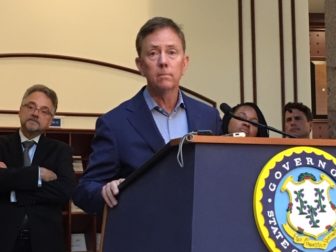Lamont Keeps a Tight Hold on CT’s Credit Card Absent a Deal with Legislature

Audio By Carbonatix

Gov. Ned Lamont speaks to reporters following a June Bond Commission meeting. Behind him are DOT Commissioner Joseph Giulietti and OPM Secretary Melissa McCaw. Photo credit: Mark Pazniokas, CTMirror.org (file photo)
The State Bond Commission will meet on Sept. 17.
By Keith M. Phaneuf, CTMirror.org
Gov. Ned Lamont kept his promise Tuesday to keep a tight grip on Connecticut’s credit card absent a deal from legislators on a long-term transportation plan.
The administration, which canceled State Bond Commission meetings in June, July and August, released an agenda for the September meeting that recommends nearly $400 million in new financing.
And while that might seem like a lot of money at first glance, nearly all the funding is dedicated for school and road construction, state facility maintenance, job development, and clean water projects. What’s missing are the tens of millions of dollars often included on commission agendas under the previous administration for smaller, community-based projects in legislators’ home districts.
The only major initiative not among the traditional bonding areas involves $25 million to assist homeowners with crumbling foundations. This effort has enjoyed overwhelming bipartisan support and is aimed at more than 30,000 homeowners spread across the eastern half of the state.
“We’re going to have a skinny bond agenda,” said Lamont, who answered questions Tuesday morning following a tour of the Hospital for Special Care in New Britain.
The governor has been at odds for much of this year with his fellow Democrats in the House and Senate over whether to curtail state borrowing. Connecticut has more than $25 billion in bonded debt and ranks among the nation’s most indebted states on a per capita basis.
The governor initially recommended that lawmakers authorize no more than $1 billion per year in general obligation, or G.O., bonding, two-thirds of what it issued on average between 2012 and 2019. G.O. bonds are repaid with income tax receipts and other revenues from the budget’s general fund and are used to fund more capital projects not involving transportation.
Lamont also wants to ramp up state investments in transportation, but favors electronic tolling, which would provide hundreds of millions of dollars in receipts that Connecticut could use to pay cash for projects instead of more borrowing.
Lawmakers, to date, have declined to adopt tolls. And since Lamont says Connecticut’s aging, overcrowded highways and rail lines must be repaired, will the state try to put more borrowing on an already maxed-out credit card?
Until that question is answered, the administration said in July, bonding for non-essential projects must wait.
“Are we going to put $700 million more [in annual bonding] on the taxpayers backs” to fund transportation? Lamont asked, adding he still believes tolls and debt avoidance is the wiser strategy. “First we’re got to deal with the gorilla in the room.”
The package includes three items with strong ties to specific communities, none of which involve recreational or entertainment purposes.
There’s $4 million for water and sewer main work near East Main Street in Waterbury to complement a local economic development effort.
Another $2 million would be borrowed to demolish the vacant Crystal Avenue apartments in New London to allow for industrial development near State Pier.
And $3 million to renovate and make improvements to the Batchelder School in Hartford to enable it to serve as the home for a regional magnet school.
Trying to reach compromise, Lamont offered earlier this summer to consider as much as as $1.3 billion per year in G.O. bonding – provided legislators would agree to dedicate $100 million of that extra $300 million for state transportation projects.
Democratic legislative leaders have countered that they need $1.3 billion per year in G.O. bonds to meet all of their non-transportation needs. If Lamont wants an extra $100 million for transportation infrastructure, they said, then the G.O. bonding total needs to climb to $1.4 billion.
Legislators say not all of the projects for which they seek state bonding involve recreational or leisure programs. Many of the community-based projects, they say, would support private, nonprofit social service groups that work with the disabled and the mentally ill. These bond dollars fund capital repairs the nonprofits otherwise could not afford.
A new, two-year bonding plan was supposed to be in place when the fiscal year began back on July 1, and cities and towns already have been hurt by that delay.
While most state aid to municipalities was included in the new, two-year, $43.4 billion state budget enacted in June, Connecticut issues bonds and borrows the funds it distributes in three grants – one of which is the $60 million Town Aid Road [TAR] program.
And half of that grant, or $30 million, was due to communities back in July. Most cities and towns rely on that installment to cover summer road repaving work.
Reprinted with permission of The Connecticut Mirror. The author can be reached at [email protected] .
Like what you see here? Click here to subscribe to We-Ha’s newsletter so you’ll always be in the know about what’s happening in West Hartford!



